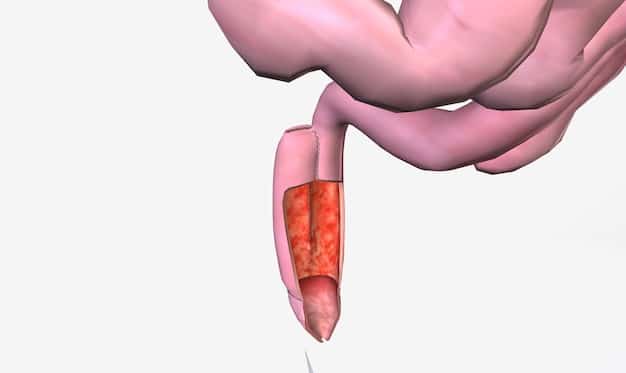Erectile Dysfunction & Heart Disease: The Hidden Link

Erectile dysfunction (ED) and heart disease often share common risk factors, such as high blood pressure, high cholesterol, obesity, and diabetes, indicating that ED could be an early warning sign of underlying cardiovascular issues.
Discover the connection between erectile dysfunction and heart disease, exploring shared risk factors and how ED can serve as an early indicator of potential cardiovascular problems, empowering you to take proactive steps for your health.
Understanding the Basics of Erectile Dysfunction
Erectile dysfunction is a common condition that affects millions of men worldwide. It’s important to understand what it is and its potential causes.
What is Erectile Dysfunction?
Erectile dysfunction (ED), also known as impotence, is the inability to achieve or maintain an erection firm enough for satisfactory sexual intercourse.
Common Causes of ED
Many factors can contribute to ED, ranging from physical health issues to psychological conditions.
- Cardiovascular disease: Conditions affecting the heart and blood vessels.
- Diabetes: High blood sugar levels can damage nerves and blood vessels.
- High blood pressure: Can damage the lining of arteries.
- Obesity: Excess weight can contribute to various health problems, including ED.

It is essential to recognize these causes and seek medical advice to address any underlying health issues. Understanding ED is the first step towards managing and treating the condition effectively.
Delving into Heart Disease: The Basics
Heart disease, or cardiovascular disease, encompasses a range of conditions that affect the heart. A basic understanding of these conditions is crucial.
Types of Heart Disease
Heart disease can manifest in several forms, each with its own characteristics and implications.
- Coronary artery disease (CAD): Plaque buildup in the arteries.
- Heart failure: The heart can’t pump enough blood to meet the body’s needs.
- Arrhythmias: Irregular heartbeats.
Risk Factors for Heart Disease
Identifying the risk factors associated with heart disease is essential for prevention and early intervention.
Common risk factors include:
- High blood pressure
- High cholesterol
- Smoking
- Family history of heart disease
By identifying and managing these risk factors, individuals can significantly reduce their risk of developing heart disease.
The Link between ED and Heart Disease: The Connection
The connection between erectile dysfunction and heart disease is more intricate than many realize. They often share common underlying issues.
Shared Risk Factors
Many risk factors that contribute to heart disease also play a significant role in the development of ED.
These shared risk factors include:
- High blood pressure
- Diabetes
- High cholesterol
ED as an Early Warning Sign
ED can sometimes serve as an early indicator of cardiovascular problems.

That’s because the arteries that supply blood to the penis are smaller than those supplying blood to the heart. So, problems with these arteries might show up first as ED.
Recognizing ED as a potential warning sign can prompt earlier evaluation and management of heart health.
How ED Can Signal Cardiovascular Issues
Erectile dysfunction can indeed be a significant indicator of potential cardiovascular problems. Understanding how these two are linked is crucial for proactive health management.
The Endothelial Connection
The endothelium, the inner lining of blood vessels, plays a crucial role in both erectile function and cardiovascular health.
When the endothelium is damaged, it can lead to both ED and heart disease. ED can be a symptom of endothelial dysfunction.
Nitric Oxide
Nitric oxide is essential for relaxing blood vessels and allowing increased blood flow to the penis, facilitating an erection.
Impaired nitric oxide production or function can contribute to both ED and cardiovascular issues. So, diminished nitric oxide availability is directly linked to both conditions.
By recognizing these intricate connections, individuals can better understand the potential cardiovascular implications of experiencing ED.
Lifestyle Changes to Improve Both ED and Heart Health
Adopting certain lifestyle changes can significantly improve both erectile dysfunction and heart disease. Healthy habits can make a big difference.
Dietary Adjustments
Making thoughtful dietary choices can profoundly impact both conditions.
Consider these tips:
- Eat a balanced diet rich in fruits, vegetables, and whole grains.
- Reduce intake of saturated and trans fats.
- Limit sugar and processed foods.
Exercise Regimen
Regular physical activity benefits both cardiovascular health and erectile function.
Engage in activities such as:
- Aerobic exercises like brisk walking or jogging.
- Strength training to improve overall fitness.
- Pelvic floor exercises to enhance erectile function.
Quitting Smoking and Limiting Alcohol
Smoking and excessive alcohol consumption can harm both the heart and erectile function.
Quitting smoking can dramatically improve overall health. Limiting alcohol intake can also help.
By implementing these lifestyle changes, individuals can take proactive steps toward improving both ED and heart health.
Medical Treatments and Consultations
In addition to lifestyle changes, medical treatments and consultations play a vital role in managing erectile dysfunction and heart disease. Consulting healthcare professionals can help.
Medications for ED
Several medications can help improve erectile function.
Common options include:
- PDE5 inhibitors (e.g., sildenafil, tadalafil)
- Alprostadil injections or suppositories
Treatments for Heart Disease
Various treatments are available for managing heart disease, depending on the specific condition.
These include:
- Medications to lower blood pressure and cholesterol
- Surgical procedures like angioplasty or bypass surgery
Importance of Medical Consultation
Consulting with healthcare professionals is essential for both ED and heart disease. They can provide tailored recommendations and treatment plans.
By seeking timely medical advice and adhering to appropriate treatment plans, individuals can effectively manage both conditions.
| Key Point | Brief Description |
|---|---|
| 🩺 Shared Risk Factors | Both ED and heart disease share risks like hypertension, cholesterol, and diabetes. |
| ⚠️ Early Warning Sign | ED can be an early indicator of underlying cardiovascular issues. |
| 🍎 Lifestyle Changes | Diet, exercise, and quitting smoking can improve both conditions. |
| 💊 Medical Treatments | Medications and procedures can help manage ED and heart disease. |
Frequently Asked Questions
▼
Yes, erectile dysfunction and heart disease often share common risk factors, making ED an early indicator. Addressing ED could lead to the discovery and treatment of underlying heart issues.
▼
Adopting a healthy diet, engaging in regular exercise, quitting smoking, and limiting alcohol intake can improve both ED and heart health. These changes enhance overall cardiovascular function.
▼
Treatment options for ED include medications like PDE5 inhibitors, while heart disease may involve medications to lower blood pressure and cholesterol, or surgical procedures like angioplasty or bypass surgery.
▼
ED and heart disease are linked through shared risk factors and impaired endothelial function. Both conditions can stem from issues affecting blood vessels and nitric oxide production.
▼
Consult a doctor if you experience persistent ED, especially if you have risk factors for heart disease. Early diagnosis and management can prevent further health complications.
Conclusion
Understanding the connection between erectile dysfunction and heart disease is crucial for proactive health management. Recognizing shared risk factors and seeking timely medical advice can lead to improved overall well-being and a better quality of life.





